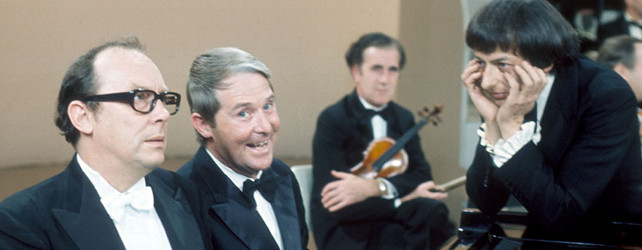It is often said that the key to great comic delivery is timing. I would go further and say it’s the key to great writing too. But before I get into that, let’s examine the power of timing in the best way possible — Morecambe and Wise.
Absolute masters of delivery, Morecambe and Wise knew exactly when to pause and when to rush on – when to interrupt and when to let the line breathe. It takes years of experience to develop that instinctive ability and make it look effortless. So it was not surprising that Eric Morecambe was incredibly concerned when Andre Previn couldn’t make rehersals for his guest spot on the 1971 Christmas Show. The world famous conductor of the LSO had been invited onto the show as a celebrity guest and to perform a sketch. Yet just before two weeks of rehearsals were to begin, Previn’s mother fell ill and he had to fly to New York. Previn didn’t return until the day of the recording and learned his lines on the flight.
Morecambe wanted to pull the sketch. Previn had never performed comedy before. They had no rehearsal time and probably only a technical camera rehearsal before they would perform the sketch live in front of an audience. The result is probably the most popular and loved of all Morecambe and Wise sketches. I have seen this sketch hundreds of times and still laugh.
Even though I know every note and beat, just like a great piece of music, I never tire of it. The words — and the jokes — may stay the same. The gags may lack their original surprise, but the enjoyment comes from the delivery and impeccable timing – the musicality of the performance. And I don’t mean the orchestra.
There is a point about four minutes thirty seconds into the sketch where Eric visibly relaxes and ad-libs his glee, relieved that the sketch isn’t only going to work, but has the potential to be something special. The moment when he realises Previn has not only memorised the script but is ad-libbing his delivery of those words like jazz. The moment when Previn says he’s going to collect his baton. “It’s in Chicago”. Morecambe lights up, exclaiming “Pow” as he is knocked back by the unexpected delivery of the line.
In a recent documentary, Eddie Braben, the writer of the sketch and an idol of mine, admitted he hadn’t written the pause into the line as some writers do. The playwright Harold Pinter became famous for what are commonly known as Pinter Pauses, which he indicated in his scripts with numerous devices. The pause might appear as an ellipsis, or the dialogue might be broken up with additional stage directions, thereby creating the disjointed stop/start effect of natural speech and conversation. Sometimes, Pinter would simply type “pause” on a separate line.
Braben wasn’t Pinter. Braben knew better than to dictate to comedians like Morecambe and Wise how a line should be delivered. He could trust them to find the most perfect comic timing without any help from script formatting. But Previn wasn’t a professional comedian.
In Braben’s script, Previn’s line would probably have looked like this.
ANDRE PREVIN
Alright. I’ll go get my baton. It’s in Chicago.
However, Previn delivers the line as if it were written like this.
ANDRE PREVIN
Alright. I’ll go get my baton.
ANDRE turns to leave.
ANDRE PREVIN
It’s in Chicago.
In retrospect, it’s no surprise that Previn had instinctive timing. He’s a musician. Not only that, he’s a conductor. And conducting beautiful music is all about the beats and pauses – when to speed up and when to slow down, when to stretch a note and when to rattle them off staccato. Therefore, he was able to give Braben’s words a cadence and rhythm that wasn’t on the page. As a result, his performance (and deadpan delivery) is one of the reasons the sketch is so well loved.
As writers, we have an enormous control over the timing of our words. Whether our prose is read aloud or merely an internal dialogue with the reader, it follows the same rules as music or even comedy. We often talk about sentences that flow, words that have rhythm, but often it is the punctuation and the placement on the page that gives the words the lyrical quality we aspire to.
Braben could easily have formatted Previn’s lines as above and the reader would sense the same comic timing as contained in the final performance. Like a Pinter script, the line breaks and extra stage direction may seem trivial and superfluous, but they help give life to the words for the benefit of the reader, even though the final audience will never see how they appear on the page.
Even the break of a paragraph can create that sense of a subtle pause, building extra meaning and music into your prose. Line breaks, commas, exclamation points, dashes and more – I find myself continually using all of the punctuation and formatting at my disposal to hopefully transform my writing into something closer to conversational speech. And that rhythm and timing then helps me to accentuate certain words, draw out particular meanings or aid easier comprehension.
Poets, of course, have known this all along, but many professional writers don’t think in terms of timing. Instead, the only yardstick is usually grammar – and sometimes not even then. Read any corporate business document, especially a legal one, and any sense of flow or rhythm may be difficult to find. All writers should be trained to think not only in terms of vocabulary and grammar but also in timing and delivery.
Whether read aloud to an audience or internally to the mind’s ear, the result is the same. Your words are a performance, often without rehearsal.
